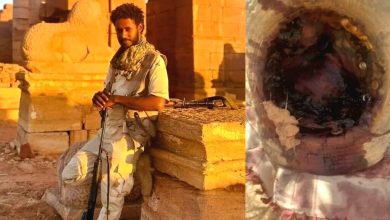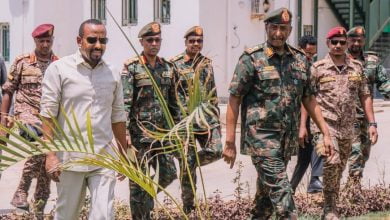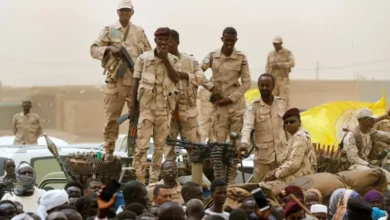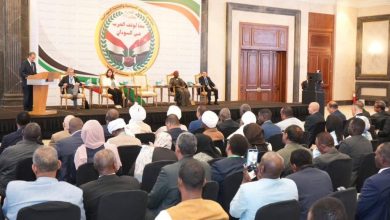National Forces Coordination Body: A Supporter of the Army or a Political Alternative?
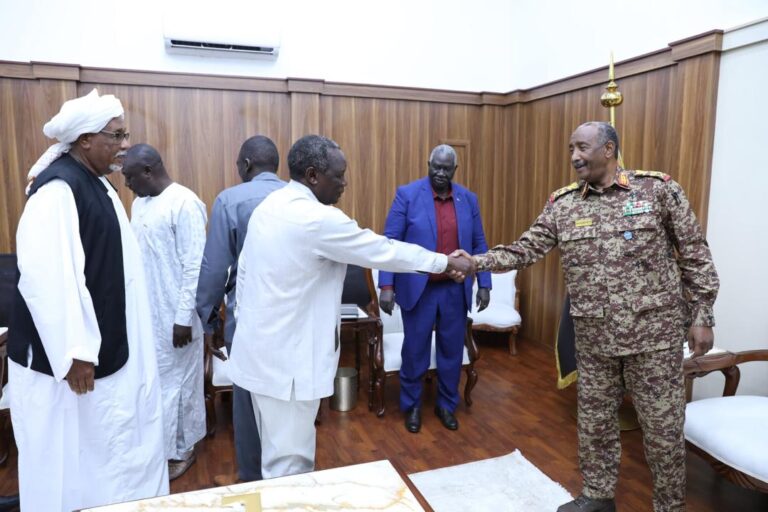
almohagig – Talal Ismail
Political forces’ reactions to the meeting between the Chairman of the Sovereignty Council, Abdel Fattah al-Burhan, and a delegation from the National Forces Coordination, led by Malik Agar Eir, Deputy Chairman of the Sovereignty Council and head of the Coordination, varied.
The Coordination announced its determination to sign a political pact between the Sudanese army and the Coordination.
Mustafa Tambour, the official spokesperson for the National Forces Coordination, announced his political bloc’s support for the Sudanese-Sudanese dialogue that does not exclude anyone and its support for popular resistance.
He also confirmed they would sign a political pact with the armed forces.
The National Forces Coordination supports the Sudanese army following its formation last week, comprising armed movements that have signed the Juba Peace Agreement, political forces, civil society organisations, a faction of the Revolutionary Front, tribal chiefs, the Higher Council for the Coordination of Peaceful Resistance Committees, and the Coordination of Eastern Sudan, the Sudanese Ba’ath Party, the Sudan People’s Movement-North, the Democratic Unionist Party, and other entities.
Among the prominent political leaders of the Coordination are Tom Hajo, Ishraqa Sayed Mahmoud, Mustafa Tambour, Nazeer Mohamed Al-Amin Turk, Mohamed Sayed Ahmed Al-Jakoumi, Ali Khalifa Askouri, and Mohamed Wada’a.
Tambour stated after the Coordination’s delegation meeting with al-Burhan that the Chairman of the Sovereignty Council was briefed on the results of the founding conference of the Democratic National Forces Coordination.
He added that the Coordination affirmed its support for the armed forces in their battle for dignity and that any political process should only start after eliminating the rebel militias that seek to hijack and destroy the country.
He further stated that an agreement was reached during the meeting to sign a political pact between the armed forces and the National Forces Coordination.
According to a statement from the Sovereignty Council, Al-Burhan presents a political vision that all political groups should agree on the minimum requirements for political action to form a government and start building Sudan after the end of the war.
On Friday, leaders from the National Forces Coordination arrived at the Wadi Seidna Military Base in Omdurman. They visited the headquarters of the radio and television and the home of the late national leader Ismail al-Azhari.
Political Rejection
However, political parties that supported the Sudanese army rejected the formation of the Coordination. Mubarak Ardol, a leader in the Freedom and Change Alliance’s Democratic Bloc, wondered, ‘Is there an effort to produce a new Framework Agreement?’ He continued, ‘I read a statement from a political group led by the Deputy Chairman of the Sovereignty Council, which was formed two days ago and called itself the National Forces Coordination. They held a press conference and a founding conference. We had previously stated that we were not participants. So far, there is no problem. But, meeting with such speed and sitting with the Chairman of the Sovereignty Council, the Commander-in-Chief of the Armed Forces, is also not a big problem. However, in the middle of the published discourse, there is a reference to seeking to sign a political pact with the armed forces.’
According to his words, Ardol warned against replicating the Framework Agreement, which led the country into a swamp of war and destruction.
The step taken by the National Forces Coordination comes after the African Union’s High-Level Panel held a dialogue two weeks ago with Sudanese parties, including the former ruling National Congress Party during Omar al-Bashir’s era.
Ardol added, ‘This dialogue issue is a fundamental and strategic matter that should not be dealt with as a temporary tactic. It is the reason why politics has remained distorted in our country since independence, where political groups exploit the military under various pretexts, ultimately to control power without making any effort to achieve consensus among political, social, and even other regional components, but rather to exclude them.’
Luay Abdel Monem, the Secretary-General of the National Track Party, said, ‘We appreciate the sincere efforts of the National Forces Coordination to support stability and reconstruction. Despite its genuine national stance against the militia coup and its aftermath, and its support for the armed forces on the battlefield, it is not the sole representative of the Sudanese people to sign a separate pact with the army.’
He continued, ‘There is no political preference or discrimination for a national entity over another. After the army’s victory and the start of reconstruction, there must be a national dialogue that includes all parties without exception, whose hands are clean and who have not collaborated with the militia in its crimes. We expect the army, as a professional national institution, to stand equidistant from everyone and fulfil its commitment to forming an independent government after the war, fostering an open national dialogue in preparation for holding general elections within a period not exceeding six months if the necessary international funding is available or within one year with the available resources.’
Observers believe that there is a divergence in political views within the components of the Freedom and Change Alliance’s Democratic Bloc that could reshape the scene in Sudan.
Rashid Diab, the Media Secretary-General of the Popular Congress Party, said, ‘Our main goal and strategic line is to return power to the people so they can determine the foundations and priorities of their rule, as well as the political, economic, social, and security policies, and ways of development and innovation in all aspects of life. We rely on the people to preserve the values of justice and cooperation, and we count on their efforts to build and achieve developmental leaps and to ignite a cultural, social, scientific, and practical revolution on the ground.’
He added, ‘The signing of a political pact with the army by some political forces does not align with the lesson learned and the benefit from the mistakes of the past that urge us to create a real transformation in the philosophy of governance, movement management, and the relationships of power and money in the country after the war, by igniting a cultural, social, scientific, and practical revolution on the ground. It also contradicts our vision of establishing community governments that respond to all societal needs and are based on the free popular consensus from the grassroots (from villages, neighbourhoods, and localities to states).’
He continued, ‘We in the Popular Congress Party will not support any vision that could lead to or result in a civilian or military dictatorship.’
Dr. Baher Idris Abu Garda, the leader of the Justice Alliance Coalition (Tis’ah), criticised the Coordination’s action in a lengthy article titled ‘The Pitfalls of Exclusion’. He considered it a hasty step resembling what the Central Council Group in the Freedom and Change Alliance (FCA) used to do, insisting on monopolising the alliance with military support.
Uncertain Future
The future of the new Coordination remains unclear, given reservations or rejection from factions and political forces considered among those supporting the armed forces in their war against the Rapid Support Forces militia and the failure of some to take a public stance so far.
Political sources within the Coordination say that they are keen to accommodate the rest of the forces within it and will seek to communicate with them to clarify the nature of their step, considering it a non-exclusionary step. This may encourage them collectively or individually to join the coordination shortly, but it is still unknown how much response this step will receive.


